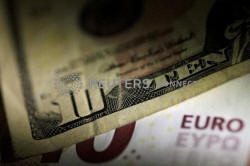Sleeping giant awakens? Downside risks for euro grow
 Send a link to a friend
Send a link to a friend
 [February 11, 2020] By
Saikat Chatterjee [February 11, 2020] By
Saikat Chatterjee
LONDON (Reuters) - A drop in the
euro/dollar exchange rate to a four-month low raises the prospect of a
repricing of one of the world’s most important macro-economic metrics
and a potential re-rating of the U.S. currency across the globe.
After settling into the narrowest trading range in the euro's two-decade
history in 2019, the euro's latest drop in the past week raises concern
about a broader decline.
(Graphic - 2019: narrowest trading range in the euro's history -
https://fingfx.thomsonreuters.com/
gfx/mkt/13/1665/1640/tradingrange.png)
The U.S. economy is outperforming its European counterpart while the
impact of the coronavirus on the Chinese economy and consequently the
German economy, Europe's powerhouse, has yet to show up in data.
Citigroup's economic surprise index for Europe has slumped to a
four-month low <.CESIEUR> while a similar gauge for United States has <.CESIUSD>
jumped to a five-month high after dismal German industrial data and
strong U.S. jobs figures last week.

(Graphic - US economic surprises surge as euro zone flags -
https://fingfx.thomsonreuters.com/
gfx/mkt/13/1978/1947/MicrosoftTeams-image%20(4).png)
"Last year we discovered how sensitive the German economy was to China,
and I think everybody is still underestimating the impact this will have
on the Chinese economy and to Europe," said John Marley, a senior FX
consultant at the FX risk management specialist SmartCurrencyBusiness.
The world's most actively traded exchange rate <EUR=> has weakened
nearly 2% in the past week to $1.09. It's less than 5% away from a
17-year low of $1.03 reached in January 2017.
Euro weakness has implications not only for European policymakers when
they are debating more stimulus, but also could signal further dollar
strength and lead to tighter financing conditions from China to Mexico.
The euro has been under the gun for the last year or so, thanks to a
relentless drop in market volatility. The latest data have only
encouraged euro bears.
(Graphic - Currency volatility hits record lows -
https://fingfx.thomsonreuters.com/
gfx/mkt/13/1982/1951/ccvol.png)
[to top of second column] |

U.S. Dollar and Euro notes are seen in this June 22, 2017
illustration photo. REUTERS/Thomas White/Illustration

Subdued price swings, at least in theory, should hurt all currencies
that have low or negative interest rates, such as the euro, the Swiss
franc and the Japanese yen, as hedge funds typically borrow in them to
invest in higher-yielding currencies such as the U.S. dollar or emerging
markets.
But the euro's case is unique in its zero correlation to geopolitical
events. That means a yield-seeking strategy of borrowing in euros and
investing in dollars can be profitable, even through episodes of missile
strikes and virus attacks.
"That negative yield and the falling volatility makes the argument of
buying and holding euros a very tough one," said Elsa Lignos, global
head of FX strategy at RBC Capital Markets in London.
In 2019, borrowing in euros and investing in U.S. dollars would have
generated a return of nearly 5%. By comparison, borrowing Swiss francs
last year and buying U.S. dollars would have only yielded a return of
1.7%. Borrowing Japanese yen would have earned just 1.5%.
That has encouraged euro bears. Hedge funds have been ramping up their
net short bets in recent weeks; net short positions are not far from a
three-year high.
That would give plenty of food for thought to forecasters in a Reuters
poll who are predicting more strength for the euro over the next 12
months. <FXPOLLS>

(Graphic - Euro positions and volatility -
https://fingfx.thomsonreuters.com/
gfx/mkt/13/1963/1932/Euro%20positions%20and%20volatility.png)
(Reporting by Saikat Chatterjee; graphics by Ritvik Carvalho; editing by
Larry King)
[© 2020 Thomson Reuters. All rights
reserved.] Copyright 2020 Reuters. All rights reserved. This material may not be published,
broadcast, rewritten or redistributed.
Thompson Reuters is solely responsible for this content. |